- Home
- Dennis Lehane
Since We Fell
Since We Fell Read online
DEDICATION
In memory of David Wickham,
a prince of Providence
and a real cool cat
EPIGRAPH
When you just give love and never get love
you’d better let love depart
I know it’s so, and yet I know
I can’t get you out of my heart
—BUDDY JOHNSON, “SINCE I FELL FOR YOU”
Masked, I advance.
—RENÉ DESCARTES
CONTENTS
Cover
Title Page
Dedication
Epigraph
Prologue: After the Staircase
I: Rachel in the Mirror 1979–2010 1: Seventy-Three Jameses
2: Lightning
3: JJ
4: Type B
5: On Luminism
6: Detachments
7: Have You Seen Me?
8: Granite
II: Brian 2011–2014 9: The Sparrow
10: Lights Up
11: Appetites
12: The Necklace
13: Refraction
14: Scott Pfeiffer of Grafton, Vermont
15: Wet
16: Reentry
17: Gattis
18: Culture Shock
19: Alden Minerals Ltd.
20: VHS
21: P380
22: The Snowblower
III: Rachel in the World 2014 23: Dark
24: Kessler
25: What Key
26: Mouthpiece
27: It
28: Plunging
29: Enough
30: Primal Self
31: Safe House
32: Confession
33: The Bank
34: The Dance
35: Family Photo
Acknowledgments
About the Author
Also by Dennis Lehane
Credits
Copyright
About the Publisher
PROLOGUE
AFTER THE STAIRCASE
On a Tuesday in May, in her thirty-fifth year, Rachel shot her husband dead. He stumbled backward with an odd look of confirmation on his face, as if some part of him had always known she’d do it.
He looked surprised too. She assumed she did as well.
Her mother wouldn’t have been surprised.
Her mother, who never married, wrote a famous book on how to stay married. The chapters were named after stages Elizabeth Childs, Ph.D., had identified in any relationship that began in a state of mutual attraction. The book was entitled The Staircase and became so successful that her mother was convinced (she’d say “coerced”) into writing two sequels, Reclimbing the Staircase and Steps of the Staircase: A Workbook, each of which sold more poorly than the last.
Privately, her mother thought all three books were “emotionally adolescent snake oil,” but she reserved a wistful fondness for The Staircase because she hadn’t been aware, when she was writing it, how little she actually knew. She said this to Rachel when Rachel was ten. That same summer, late into her afternoon cocktails, she told her, “A man is the stories he tells about himself, and most of those stories are lies. Never look too closely. If you uncover his lies, it’ll humiliate you both. Best to just live with the bullshit.”
Then her mother kissed her head. Patted her cheek. Told her she was safe.
Rachel was seven when The Staircase was published. She remembered the endless phone calls, the flurry of trips, her mother’s renewed dependence on smoking, and the desperate, chiseled glamour that overtook her. She remembered a feeling she could barely articulate, that her mother, never happy, grew even more bitter with success. Years later, she’d suspect the reason was because the fame and the money robbed her mother of excuses for her unhappiness. Her mother, brilliant at analyzing the problems of strangers, never had a clue how to diagnose herself. So she spent her life in search of solutions to problems that were born, raised, lived, and died within the boundaries of her own marrow. Rachel didn’t know any of that at seven, of course, or even at seventeen. She only knew that her mother was an unhappy woman, so she was an unhappy child.
When Rachel shot her husband, she was on a boat in Boston Harbor. Her husband remained on his feet for only the briefest of time—seven seconds? ten?—before he fell over the stern and into the water.
But in those final seconds, a catalogue of emotion found his eyes.
There was dismay. Self-pity. Terror. An abandonment so total it took thirty years off his life and turned him into a ten-year-old before her eyes.
Anger, of course. Outrage.
A sudden and fierce determination, as if, even as the blood spilled from his heart and over the hand he’d cupped below it, he’d be okay, he’d be fine, he’d get through this. He was strong, after all, he’d created everything of value in his life by force of will alone and he could will himself out of this.
Then the dawning realization: No, he couldn’t.
He looked right at her as the most incomprehensible of emotions staked its claim and subsumed all others:
Love.
Which was impossible.
And yet . . .
There was no mistaking it. Wild, helpless, pure. Blooming and splattering in tandem with the blood on his shirt.
He mouthed it, as he often did from the other side of crowded rooms: I. Love. You.
And then he fell off the boat and vanished beneath the dark water.
Two days before, if someone had asked her if she loved her husband, she would have said, “Yes.”
Actually, if someone had asked her the same question as she pulled the trigger, she would have said, “Yes.”
Her mother had a chapter about that—Chapter 13: “Discordance.”
Or was the next chapter—“The Death of the Old Narrative”—more applicable?
Rachel wasn’t sure. She got them confused sometimes.
I
RACHEL IN THE MIRROR
1979–2010
1
SEVENTY-THREE JAMESES
Rachel was born in the Pioneer Valley of western Massachusetts. It was known as the Region of the Five Colleges—Amherst, Hampshire, Mount Holyoke, Smith, and the University of Massachusetts—and it employed two thousand faculty to teach twenty-five thousand students. She grew up in a world of coffee shops, B&Bs, wide town commons, and clapboard houses with wraparound porches and musky attics. In autumn, leaves fell by the tubful and choked the streets, spilled onto sidewalks, and clogged fence holes. Some winters, snow encased the valley in silence so dense it became its own sound. In July and August, the mail carrier rode a bicycle with a bell on the handlebar, and the tourists arrived for summer stock theater and antiquing.
Her father’s name was James. She knew little else about him. She recollected that his hair had been dark and wavy and his smile sudden and unsure. At least twice he’d taken her to a playground with a dark green slide where the Berkshire clouds hung so low he’d needed to wipe the swing free of condensation before he could place her on it. On one of those trips he’d made her laugh but she couldn’t recall how.
James had been an instructor at one of the colleges. She had no idea which one or if he’d been an adjunct, an assistant professor, or an associate on tenure track. She didn’t even know if he taught at one of the Five Colleges. He could have been at Berkshire or Springfield Technical, Greenfield CC or Westfield State, or any of a dozen other colleges and junior colleges in the region.
Her mother was teaching at Mount Holyoke when James left them. Rachel was just short of three and could never say with certainty if she’d borne witness to the day her father walked out of the house or if she’d just imagined it to suture the wound his absence left behind. She heard her mother’s voice coming through the wall of the sm
all house they’d rented that year on Westbrook Road. Do you hear me? If you go out that door, I will expunge you. Shortly thereafter, the bump of a heavy suitcase on the stairs out back followed by the snap of a trunk closing. The rasp and whistle of a cold engine clamoring to life in a small car, then tires crunching winter leaves and frozen dirt followed by . . . silence.
Maybe her mother hadn’t believed he’d actually leave. Maybe once he had, she’d assured herself he’d return. When he didn’t, her dismay turned to hate and her hate grew depthless.
“He’s gone,” she said when Rachel was about five and had begun asking persistent questions about his whereabouts. “He wants nothing to do with us. And that’s okay, sweetie, because we don’t need him to define us.” She got down on her knees in front of Rachel and tucked an errant hair behind her ear. “Now we won’t speak of him again. Okay?”
But of course Rachel spoke of him and asked about him. At first it exasperated her mother; a wild panic would find her eyes and flare her nostrils. But eventually the panic was replaced with a strange, tiny smile. So tiny it was barely a smile at all, just a slight uptick of the right side of her mouth that managed to be smug, bitter, and victorious all at the same time.
It would be years before Rachel would see the onset of that smile as her mother’s decision (whether conscious or unconscious, she’d never know) to make her father’s identity the central battleground in a war that colored Rachel’s entire youth.
Her mother promised to tell her James’s last name on her sixteenth birthday, provided Rachel showed a level of maturity that would suggest she could handle it. But that summer, just before she turned sixteen, Rachel was arrested in a stolen car with Jarod Marshall, whom she’d promised her mother she was no longer seeing. The next target date was her high school graduation, but after an Ecstasy-related debacle at the semiformal that year, she was lucky to graduate at all. If she went to college then, a community college first to get her grades up, then a “real” one, her mother said, maybe then.
They fought continuously over it. Rachel would scream and break things and her mother’s smile would grow colder and smaller. She would repeatedly ask Rachel, “Why?”
Why do you need to know? Why do you need to meet a stranger who’s never been a part of your life or your financial security? Shouldn’t you first take stock of the parts of you that are bringing you such unhappiness before you journey out into the world to find a man who can offer no answers and bring you no peace?
“Because he’s my father!” Rachel screamed more than once.
“He’s not your father,” her mother said with an air of unctuous sympathy. “He’s my sperm donor.”
She said that at the tail end of one of their worst fights, the Chernobyl of mother-daughter spats. Rachel slid down the wall of the living room in defeat and whispered, “You’re killing me.”
“I’m protecting you,” her mother said.
Rachel looked up and saw, to her horror, that her mother believed that. Far worse, she defined herself by that belief.
Rachel’s junior year in college, while she was in Boston, sitting in Introduction to British Literary Studies Since 1550, her mother blew a red light in Northampton, and her Saab was T-boned by a fuel truck driving the speed limit. At first there was concern that the shell of the fuel truck had been pierced in the accident, but it turned out not to be the case. This was a relief for the fire and rescue crews who came from as far away as Pittsfield: The fuel truck had just topped off and the intersection was in a dense area by both a senior citizens home and a basement-level preschool.
The driver of the fuel truck suffered mild whiplash and tore a ligament in his right knee. Elizabeth Childs, once-famous author, died upon impact. If her national fame had long since subsided, however, her local celebrity still burned bright. Both the Berkshire Eagle and the Daily Hampshire Gazette ran her obituary on the front page, below the fold, and her funeral was well attended, though the gathering back at the house afterward was less so. Rachel would end up donating most of the food to a local homeless shelter. She spoke to several of her mother’s friends, mostly women, and one man, Giles Ellison, who taught poli-sci at Amherst and who, Rachel had long suspected, had been her mother’s occasional lover. She could tell her assumption was correct by the way the women paid special attention to him and by how little Giles spoke. A normally gregarious man, he kept parting his lips as if he wished to speak but then changed his mind. He looked around the house like he was drinking it in, as if its contents were familiar and had once brought him comfort. As if they were all he had left of Elizabeth and he was taking stock of the fact he’d never see them, or her, again. He was framed by the parlor window that looked down Old Mill Lane on a drizzly April day and Rachel felt a tremendous pity rise up in her for Giles Ellison, rapidly aging toward retirement and obsolescence. He’d expected to go through that rite of passage with an acerbic lioness by his side, but now he’d go through it alone. It was unlikely he’d find another partner as radiant with intelligence and rage as Elizabeth Childs.
And she had been radiant in her own officious, acerbic way. She didn’t enter rooms, she swept into them. She didn’t engage friends and colleagues, she gathered them to her. She never napped, rarely seemed tired, and no one could ever remember her falling ill. When Elizabeth Childs left a room, you felt it, even if you’d arrived after she’d gone. When Elizabeth Childs left the world, it felt the same way.
It surprised Rachel to realize just how little she was prepared for the loss of her mother. She had been a lot of things, most of them not positive in her daughter’s opinion, but she had always been so utterly there. And now she was so utterly—and so violently—gone.
But still the old question persisted. And Rachel’s clear access to the answer had died with her mother. Elizabeth may have been unwilling to provide that answer, but she had unquestionably been in possession of it. Now, possibly no one was.
However well Giles and her friends and agent and publisher and editor had known Elizabeth Childs—and they all seemed to know a version of her that differed slightly but crucially from the woman Rachel had known—none of them had known her longer than Rachel’s lifespan.
“I wish I knew anything about James,” Ann Marie McCarron, Elizabeth’s oldest friend in the area, told Rachel once they were sufficiently lubricated for Rachel to broach the subject of her father, “but the first time I ever went out with your mother was months after they broke up. I remember he taught in Connecticut.”
“Connecticut?” They sat on the three-season porch at the back of the house, just twenty-two miles due north of the Connecticut border, and somehow it had never occurred to Rachel that her father could just as easily have taught not at one of the Five Colleges or the fifteen other colleges on the Massachusetts side of the Berkshires but just half an hour south in Connecticut.
“University of Hartford?” she asked Ann Marie.
Ann Marie pooched her lips and nose at the same time. “I don’t know. Could be.” Ann Marie put her arm around her. “I wish I could help. And I wish you’d let it go too.”
“Why?” Rachel said (the eternal why, as she’d come to think of it). “Was he that bad?”
“I never heard he was bad,” Ann Marie said with a minor slur and a sad grimace. She looked out through the screen at the stone-colored mist in the gray hills and spoke with a firm finality. “Honey, I only heard that he’d moved on.”
Her mother left everything to her in her will. It was less than Rachel would have imagined but more than she needed at twenty-one. If she lived frugally and invested wisely, she could conceivably live off her inheritance for ten years.
She found her mother’s two yearbooks in a locked drawer in her office—North Adams High School and Smith College. She’d received her master’s and Ph.D. from Johns Hopkins (at twenty-nine, Rachel realized, Jesus), but the only record of that was the framed diplomas on the wall by the fireplace. She went through the yearbooks three times, forcing a snail’s pace
upon herself each time. She found, in total, four pictures of her mother, two formal, two as part of a group. In the Smith yearbook she found no students named James because it was an all-girls school, but she did find two faculty members, neither of whom was the right age or had black hair. In the North Adams High School yearbook, she found six boys named James, two of whom could have been him—James McGuire and James Quinlan. It took her half an hour at the South Hadley Library computer to ascertain that James McGuire of North Adams had been paralyzed in a whitewater rafting accident while still in college; James Quinlan had majored in business administration at Wake Forest University and rarely left North Carolina, where he’d built a successful chain of teak furniture stores.
The summer before she sold the house, she visited Berkshire Security Associates and met with Brian Delacroix, a private investigator. He was only a few years older than she was and carried himself with the rangy ease of a jogger. They met in his second-story office suite in an industrial park in Chicopee. It was a shoebox of an office, just Brian and a desk, two computers, and a row of file cabinets. When she asked where the “associates” in the firm name were, Brian explained that he was that associate. The main offices were in Worcester. His Chicopee satellite was a franchise opportunity and he was just starting out. He offered to refer her to a more seasoned operative, but she really didn’t feel like climbing back in her car and schlepping all the way to Worcester, so she rolled the dice and told him why she’d come. Brian asked a few questions and wrote on a yellow legal pad and met her eyes often enough for her to feel a simple tenderness in his that seemed older than his years. He struck her as earnest and new enough at the business to still be honest, an opinion he validated two days later when he advised her not to hire him or anyone else for that matter. Brian told her he could take her case and probably bill her for at least forty hours of work before he came back with the same opinion he was offering now.

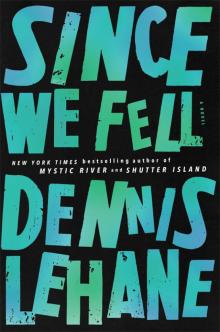 Since We Fell
Since We Fell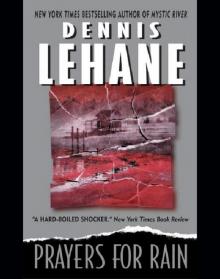 Prayers for Rain
Prayers for Rain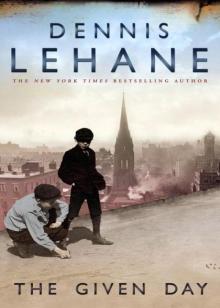 The Given Day
The Given Day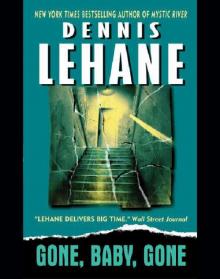 Gone, Baby, Gone
Gone, Baby, Gone Mystic River
Mystic River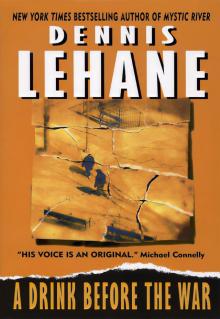 A Drink Before the War
A Drink Before the War Shutter Island
Shutter Island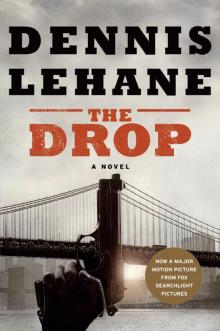 The Drop
The Drop Moonlight Mile
Moonlight Mile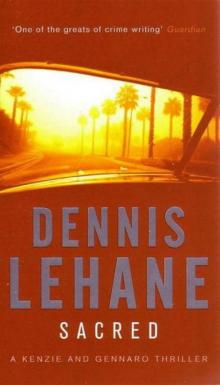 Sacred
Sacred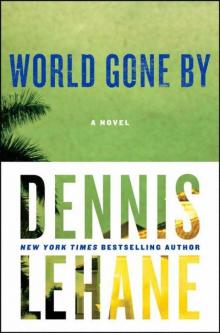 World Gone By
World Gone By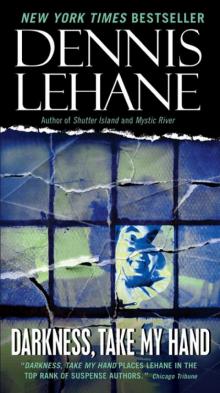 Darkness, Take My Hand
Darkness, Take My Hand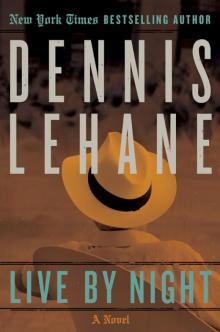 Live by Night
Live by Night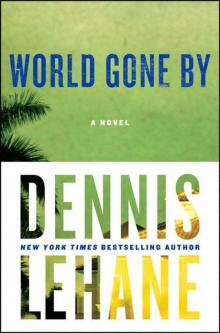 World Gone By: A Novel
World Gone By: A Novel Coronado
Coronado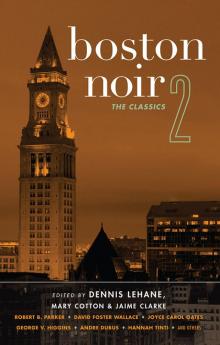 Boston Noir 2
Boston Noir 2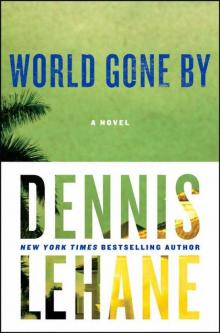 World Gone By: A Novel (Joe Coughlin Series)
World Gone By: A Novel (Joe Coughlin Series)